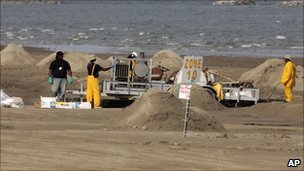 Tests on BP's newly capped Gulf of Mexico oil well show pressure has been building up slightly as hoped with no signs of leakage, BP says.
Tests on BP's newly capped Gulf of Mexico oil well show pressure has been building up slightly as hoped with no signs of leakage, BP says.
BP vice-president Kent Wells said rising pressure "is giving us more and more confidence". Tests, however, could be extended beyond Saturday.
The new cap has managed to stop the flow of oil for the first time since a 20 April explosion killed 11 people.
The spill has been described as the worst environmental disaster in the US.
It has affected hundreds of miles of Gulf coastline since April, with serious economic damage to the region as tourists have avoided Gulf Coast beaches and fishing grounds have remained closed.
BP has put the costs of dealing with the disaster at over $3.5bn.
It has already paid out more than $200m (£130m) to 32,000 claimants. The company is evaluating a further 17,000 for payment and is seeking more information on 61,000 other claims.
Extending test
The flow of oil was shut off at 1425 local time (1925 GMT) on Thursday, as part of a test of well's integrity.
If the pressure within the new cap on the well stays high, it could mean there are no other leaks or ruptures within the well bore. If it drops, that could suggest problems.
On Saturday, as the initial testing was coming to an end, Mr Wells said, "We're feeling more confident that we have integrity."
"At this point there's no evidence that we don't have integrity," he said at a regular news briefing.
"That's very good and the fact that the pressure continues to rise is giving us more and more confidence as we are getting through the test."
Mr Wells indicated that the test could be extended. "The longer the test goes, the more confidence we have in it," he said.
It is not clear what will happen next. BP has suggested it might be possible to keep the well shut, with oil collection vessels left on standby.
Adm Thad Allen, the US official overseeing the spill response, will decide what happens at the end of this test.
He may say that BP should return to siphoning off the escaping oil into four vessels with the capacity to collect 80,000 barrels - all or virtually all of the oil - each day, and keeping the cap as an emergency hurricane measure, says the BBC's Laura Trevelyan in Louisiana.
That would mean oil flowing into the Gulf of Mexico briefly as the pressure on the cap is eased and the capturing ships are hooked up again.
BP is drilling a relief well which should intercept the leaking one at the end of July, enabling it to be sealed by mid-August.



